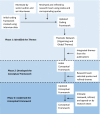An empirically based conceptual framework for fostering meaningful patient engagement in research
- PMID: 28984405
- PMCID: PMC5750689
- DOI: 10.1111/hex.12635
An empirically based conceptual framework for fostering meaningful patient engagement in research
Abstract
Background: Patient engagement in research (PEIR) is promoted to improve the relevance and quality of health research, but has little conceptualization derived from empirical data.
Objective: To address this issue, we sought to develop an empirically based conceptual framework for meaningful PEIR founded on a patient perspective.
Methods: We conducted a qualitative secondary analysis of in-depth interviews with 18 patient research partners from a research centre-affiliated patient advisory board. Data analysis involved three phases: identifying the themes, developing a framework and confirming the framework. We coded and organized the data, and abstracted, illustrated, described and explored the emergent themes using thematic analysis. Directed content analysis was conducted to derive concepts from 18 publications related to PEIR to supplement, confirm or refute, and extend the emergent conceptual framework. The framework was reviewed by four patient research partners on our research team.
Results: Participants' experiences of working with researchers were generally positive. Eight themes emerged: procedural requirements, convenience, contributions, support, team interaction, research environment, feel valued and benefits. These themes were interconnected and formed a conceptual framework to explain the phenomenon of meaningful PEIR from a patient perspective. This framework, the PEIR Framework, was endorsed by the patient research partners on our team.
Conclusions: The PEIR Framework provides guidance on aspects of PEIR to address for meaningful PEIR. It could be particularly useful when patient-researcher partnerships are led by researchers with little experience of engaging patients in research.
Keywords: conceptual framework; patient and public involvement; patient engagement in research; patient-oriented research.
© 2017 The Authors Health Expectations Published by John Wiley & Sons Ltd.
References
-
- Hewlett S, Wit M, Richards P, et al. Patients and professionals as research partners: challenges, practicalities, and benefits. Arthritis Rheum. 2006;55:676‐680. - PubMed
-
- Staley K. Exploring impact: public involvement in NHS, public health and social care research. Eastleigh: INVOLVE; 2009. http://www.invo.org.uk/posttypepublication/exploring-impact-public-invol.... Accessed September 30, 2016.
-
- Staniszewska S, Brett J, Mockford C, Barber R. The GRIPP checklist: strengthening the quality of patient and public involvement reporting in research. Int J Technol Assess Health Care. 2011;27:391‐399. - PubMed
Publication types
MeSH terms
LinkOut - more resources
Full Text Sources
Other Literature Sources
Molecular Biology Databases


